- Home
- Gary Corby
Death Ex Machina Page 2
Death Ex Machina Read online
Page 2
“What’s that?” Diotima asked.
“That the actors are imagining things.” I helped Diotima off the couch. “We’ll have to go see for ourselves.”
SCENE 3
THE GHOST OF THESPIS
SOCRATES TAGGED ALONG. There are few things harder to shake than a little brother.
Our house lies outside the city walls, to the southeast. The three of us entered the inner city through the Itonian Gate.
Two guards stood on duty, both of them bored, but too scared to slack off for fear their officer would check on them. They were ephebes, trainee recruits who were serving out their mandatory two years in the army, as must every young man from the moment he turns eighteen until he’s twenty. I knew how bored they were because three years ago, I’d been one of them.
These two were local lads from our own deme. Their families lived only a few streets from our own. They knew us and waved us through with a pleasant word and an appreciative glance at Diotima.
Diotima wore a new chiton of linen that she’d dyed in bright party colors. When she’d appeared in it that morning, I’d pointed out that the Great Dionysia hadn’t begun yet. Diotima had replied that it was close enough.
She wasn’t the only one to have started early. Many of the travelers who passed through the gate were already in their best, brightest clothes. Complete strangers talked to one another, smiled and laughed at each others’ jokes. Even the air we breathed was in a party mood. The one thing you are guaranteed to find at any gate in Athens is donkey droppings, yet on this day the aroma was fresh and pleasant. Diotima said it was because Gaia, who ruled the Earth, wished Dionysos well. I suggested it might have more to do with the frequent showers we’d been having. The rain kept down the dust. Diotima replied that was Gaia’s way of arranging things.
We walked north up Tripod Road. Both sides were lined with three-legged braziers. They were the trophies given to previous winners at the Great Dionysia, each erected along this road, with a plaque, for the passersby to admire and for the victors to gloat. One of those trophies belonged to Pericles. He had been the choregos—the producer—of a winning play fourteen years ago. The truth is that Pericles had won because he’d hired Aeschylus to write the script. When you’re Pericles, you can afford the very best. He was inordinately proud of that achievement. Every day since, Pericles had sent a slave to polish his trophy.
We turned left just before the Acropolis, onto a street that was well kept but that had seen recent heavy use. It was Theater Road, and right before us was the Theater of Dionysos. The Acropolis towered above, directly behind the theater.
A wooden wall painted in blues and reds blocked the view of the backstage. Men clustered at this wall. As we approached, we could hear them arguing with tired voices. The way they stood with shoulders bowed, I guessed they’d been at it for some time.
“… and I tell you again, Sophocles, we’re not going in there until the ghost is removed.”
“I remind you once more, gentlemen, there are no such things as ghosts.”
The man who didn’t believe in ghosts was of middle age, with a long face that was well bearded. I thought he must buy his clothes from the same place as Pericles. Both of them were top-notch in respectable fashion. This man must be the one of the playwrights, or a choregos.
The argument broke off when Diotima, Socrates, and I stopped before them.
“Who are you?” one of the men asked. He was dressed in an exomis, typical clothing for an artisan. I guessed he must be a stagehand. I preferred an exomis myself because it left my arms and legs free to move.
“Nicolaos, son of Sophroniscus,” I said. “Pericles asked me to look into this ghost.”
The well-dressed man looked at me oddly.
“You’re going to get rid of the ghost?” someone else asked. I would need to learn all their names before this was done. For now I thought of him as the one with the strong muscled arms.
“Yes,” I said confidently.
“Who are they?” He pointed rudely at Diotima and Socrates.
“My brother and my assistant,” I said. “This lady is an expert on ghosts.”
Diotima looked startled. She said, “But Nico, there’s no such thing as—ouch!”
I’d stamped on her foot.
“There’s no such thing as a ghost Diotima can’t find,” I finished smoothly.
They looked doubtful.
“Well, I may as well get started,” I said cheerfully. “Let’s have a look at the haunted theater, shall we?”
“I’m not going in there, it’s dangerous!” said the well-muscled man.
I’d wondered if the whole story might be an excuse to avoid work, but the man was genuinely scared. So, by the look of them, were the others. I said, “If you won’t, who will?”
“I am Sophocles, son of Sophilos,” the well-dressed man said.
“Are you a choregos, sir?” I asked.
Sophocles grimaced. “If I was, I would this moment be facing financial ruin. No, young man, I am the playwright, and if this problem is not solved then my only fear is utter professional disgrace before my fellow citizens.”
He glared at the men about us.
“If these foolish men are too scared to enter the theater, I am not. Let us go.”
The backstage was open to the sky. Another wall hid the backstage area from the audience’s view. The effect was a room with no roof and wide entrances to each side. The walls that were so gaudy on the outside were rough, unpainted and drab within. It seemed that theatrical illusion stopped at the surface.
One large item dominated the space.
“What is that?” I said, pointing.
“That’s the machine,” Sophocles said. “We use it to lift actors into the air when they’re playing gods.”
“Oh, of course.”
I’d seen actors float off the ground during plays. They hung from a rope at the end of a wooden arm. I’d never given a thought to what must be happening behind the scenes. The machine looked much like the dockside cranes at the wharves at Piraeus. I said as much to Sophocles.
“Very similar,” Sophocles agreed. “Ours is of more delicate construction. We need a longer arm to reach over the skene—that’s the wall you see there that separates us from the stage—and ours has a thinner arm so it’s less noticeable. Our machine only needs to lift a man.”
“Sir, may I ask, how does the machine work?” Socrates asked. He stared at it in fascination.
Sophocles looked at the boy in surprise, then said, “Well, lad, three men hold the end with the short arm. They pull down and the long arm goes up. They push the short arm sideways and the long arm goes over the skene. It’s very simple.”
“Yes, sir, I see that,” Socrates said. “But three men couldn’t normally lift one man so high, could they?”
“No,” Sophocles said.
“Then the machine must be doing something. How does it do that?”
Sophocles shrugged. “Who cares? It works. That’s all a theater man needs to know.”
“Thank you, sir,” Socrates said politely.
Socrates walked over to inspect the machine more closely. I knew that would be the last we saw of him until he had worked out the machine to whatever satisfaction he required, or until someone physically dragged him away.
“Tell us about this ghost, Sophocles,” Diotima said.
“I was startled when you said Pericles had sent you. He knows perfectly well there is no ghost.”
I nodded. “His plan is not to try to convince the actors and crew that there is no ghost, but instead to fool them into thinking that the ghost has been removed. He thinks it would be easier than convincing people who believe in the ghost that there never was one.”
“His idea is clever,” Sophocles said.
I said, “Sophocles, what is it that’s caused so much fear among the crew?”
Sophocles frowned and pursed his mouth. “There have been a few accidents, probably due to negligence among
the men. That, and a little bad luck, and some over-active imaginations were enough to convince everyone that a malevolent spirit is haunting the Theater of Dionysos.”
“I see.” I didn’t like the sound of that. Accidents and an over-active imagination are a normal part of life. But bad luck is sent by the Gods, and usually means something has offended them.
“Since we all agree that there’s no ghost, what are we doing in here?” Sophocles asked.
“We’re inspecting the entire theater, sir,” I said. “So that we can report to the crew that we’ve found definite signs of the ghost and are taking steps to expel it. Then we’ll go away, return with some seawater, some herbs, and a small sacrifice. Diotima will perform a ceremony—a genuine one so that the Gods are honored—and then we’ll tell your actors and crew that the ghost is gone, cast out by … by …”
I wasn’t sure who would cast out the ghost.
“By the power of the Lady Artemis, goddess of the hunt,” Diotima finished. “She’s the only goddess I’m qualified to officiate for.”
Sophocles nodded his appreciation. “The Huntress is a fine choice for chasing an evil spirit.” Then he frowned, in afterthought. “Should we not also sacrifice to Dionysos? It is his theater after all.”
That was a good point.
“We’ll need a priest of Dionysos,” Diotima said.
“That will be no problem,” said Sophocles. “The high priest of Dionysos is known to me.”
Sophocles was clearly a man who moved in exalted circles. There was another important man who should be present, but I hadn’t seen him. I asked, “Who is the choregos of your play, sir? Where is he?”
“His name is Thodis, of the deme Pallene. He returned to his home when it became clear that the actors could not be moved. Probably to weep in private.”
Pallene was one of the most ancient demes, so old that it had once been its own city, until Athens grew to encompass it. It was a place of wealthy estate owners and old money. I could easily see how a man of Pallene would have the funds to back a tragedy in the Great Dionysia.
Diotima said, “You spoke of accidents.”
“Things have gone wrong during rehearsals,” Sophocles said. “But only since my play was given use of the theater. Before that, everything was running smoothly.”
“I don’t understand,” I said.
“There are ten choral performances, five comedies, and three tragedies to be played, in that order. It’s the custom that we take turns for use of the theater, to practice our work, in the order in which we appear.”
“I see,” I said.
“The tragedies occupy the final three days because they are the most important event,” Sophocles said without the slightest hint of modesty. “By the drawing of lots my play is the final performance. I am therefore last to rehearse in the theater. There were problems from the moment we took possession. No one noticed at first because things always go wrong during rehearsals. Then the wave of little problems mounted until even the stage crew began to mutter. Each incident on its own was entirely trivial, or obvious bad luck.”
“Could you list them, please?” I said.
“The first was the broom left lying at the stage entrance. Romanos tripped over it as he made an entrance.”
“Romanos is?”
“Our third actor—the tritagonist. It was only a little thing, really, but it spoke of sloppiness on the part of the stagehands. Kiron—he’s the stage manager—had harsh words for everyone who works backstage. They all denied dropping it.”
“It doesn’t seem like much,” I said dubiously.
“That’s what I just told you,” Sophocles said in exasperation. “But then we all fell ill.”
“Surely a ghost couldn’t cause that.”
“No, but the tainted water in the water bottles could.”
Sophocles pointed to the back tables, where amongst all the stage kit was a row of ceramic water coolers and clay cups.
“We drink from those. The slave who sees to filling them must have collected bad water, because after a rehearsal a few days ago every one of us fell ill. Half of us had vomiting and diarrhoea. We couldn’t work the next day, and it was a struggle the day after.”
Bad water happens to every household from time to time. It only needs the house slave to fill the water bottles from the public fountain at an unlucky time.
“What else?” I asked.
“The broken props. We came in one morning to find that the masks had been torn.”
Diotima had walked to the back wall. A row of tables was arrayed along it.
“These?” Diotima asked. She picked up a mask that lay on the prop tables.
Sophocles nodded. “Precisely. The actors wear them, to represent different characters. All our masks were damaged one night. We arrived to find them slashed.”
“By a knife?”
“It looked more like claw marks to me. I thought some animal must have got at them. Perhaps a wild cat. I had to ask the choregos to pay for new masks. Fortunately the maskmaker was available. He’d finished all the masks for the festival. But he charged extra. He at least didn’t think there was a ghost. Oh no. He thought we hadn’t taken proper care of his work.” Sophocles threw his arms up in frustration. “By this time the muttering among the men had turned to open talk. They are convinced it’s the ghost of Thespis.”
“Who’s Thespis?”
“The first man ever to act on stage. He’s long dead. My friend Aeschylus tells of seeing Thespis act when he was but a small boy. Aeschylus says Thespis was not only the first actor, but the best he’s ever seen.”
I knew Aeschylus. He was an old man about to retire. If he’d seen this Thespis as a small boy, then Thespis had indeed lived long ago. I pointed out the obvious, “If it’s the ghost of Thespis, then why did he wait all this time to appear?”
Sophocles grimaced. “It’s nonsense of course. I’m afraid it was me who put the idea of Thespis in their heads. Rehearsals haven’t been going well. You can see why. To lighten the mood I made a half-hearted joke that Thespis would be furious with us if he saw the state of our play. Someone latched onto my comment and magnified it into an angry spirit. The worst was when one of the men saw the ghost.”
“What?”
“Akamas. He’s one of the stagehands. The one who was rude to you out back. He’s also a troublemaker. He says he was in here late one night and saw the ghost. That was the over-active imagination I told you about. He turned up next morning babbling about a ghost in the theater.”
I made a mental note to talk to this Akamas.
Sophocles went on, “That same morning, the railing on the balcony suddenly collapsed. No one was hurt, fortunately, but it was a close call for Lakon, who was standing on it at the time. That was the end of any chance of getting the players to play.”
“Where’s the balcony?” I asked.
Sophocles led us around the skene and onto the stage.
The balcony was directly above us, held up on four long wooden legs that had been painted white. It looked sturdy enough.
Sophocles pointed. “The actors stand there when they are playing a god. During the incident with the railing, Lakon leaned upon it, and the railing simply fell away. He almost went over with it, which would have been a disaster for the play. Lakon is our first actor, our protagonist. He’s irreplaceable.” He sighed. “I had harsh words for the carpenters. They fixed it at once, but what’s the point if the actors won’t play?”
“Must gods stand upon the balcony?” I asked. “Maybe you could avoid it.”
Sophocles held his hands up in horror. “Don’t even suggest it. Imagine if you were the goddess Athena, I mean the real goddess, and you looked down from Mount Olympos to see that someone in Athens was not only pretending to be you, but stood on the same level as ordinary mortals. How would you feel?”
I thought about it. “Not good,” I said.
“Exactly. Our gods stand above the crowd, to avoid insulting the real
ones.”
“Does Athena appear in your play, Sophocles?” Diotima asked.
“No. I have Zeus, the king of the Gods, and Thanatos, the god of death.”
“Death! What’s the play about?” I asked. “Or shouldn’t I ask?”
“Certainly you may ask. The title is Sisyphus, King of Corinth. The story is of that ancient king’s fall from power due to his serious personality defects, and his subsequent terrible punishment in Hades.”
“Doomed to push the boulder uphill, only to have it roll back down again, for all eternity,” I said.
“Yes, that’s how the play ends.” Sophocles sighed. “The net result of all these problems is that, even if the actors and crew return to work at once, we still won’t be ready in time for the Great Dionysia.”
“Don’t worry, Sophocles,” I said. “We’ll help you.”
“So you will tell the men the ghost is gone?” Sophocles said.
I thought about the bottles of tainted water, the broken props, and the damaged balcony.
I said, “The problem is, I think the ghost might be real.”
SCENE 4
THE MASK
“NΟ, I DON’T think there’s an evil spirit haunting the theater,” I said. “But I’m sure there’s a mortal man of ill will. Someone’s trying to wreck the play.”
Diotima and I had left the theater, leaving behind Socrates, who was still prodding and poking the machine. We had stopped only long enough to tell the men waiting outside that we had detected clear signs of a malign presence (which was true), that we knew how to deal with it (which was also true), and that by the time we were finished there would be no ghost in the theater (take that one as you will).
“They all look like accidents, Nico. You can’t prove otherwise,” said my wife, who is the logical one in our partnership.
“Yes, but there’ve been too many to call it coincidence. The best explanation is sabotage,” I told her. I’m the cynical, suspicious one.
Diotima bit her lip while she thought about it. “I was wondering the same thing,” she admitted. “But I’m less certain than you are. Why would someone want to wreck the Dionysia?”

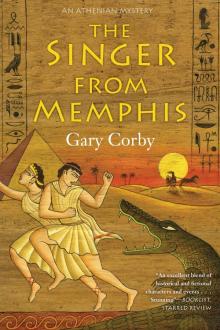 The Singer from Memphis
The Singer from Memphis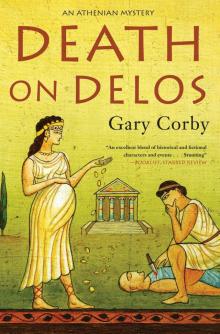 Death on Delos
Death on Delos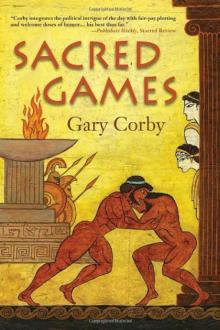 Sacred Games
Sacred Games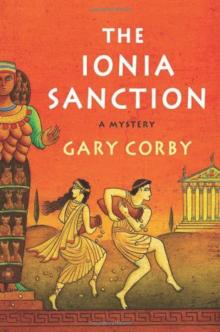 The Ionia Sanction
The Ionia Sanction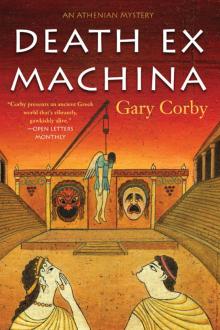 Death Ex Machina
Death Ex Machina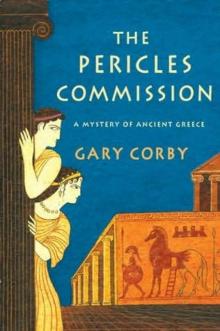 The Pericles Commission
The Pericles Commission